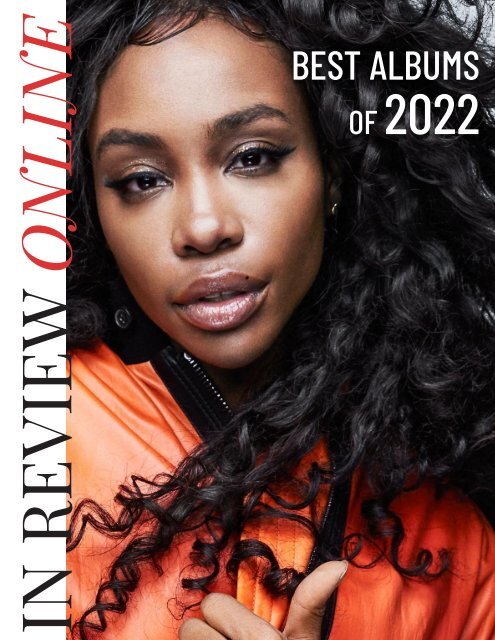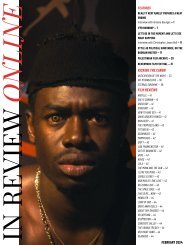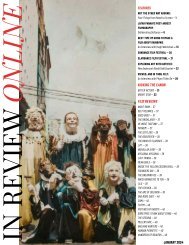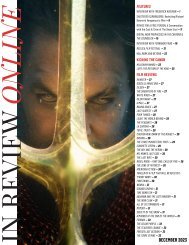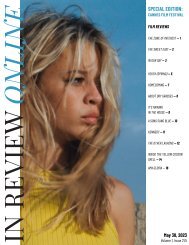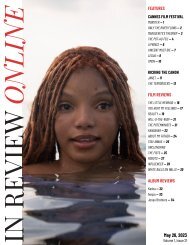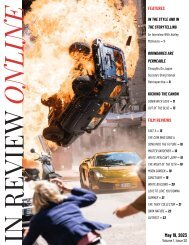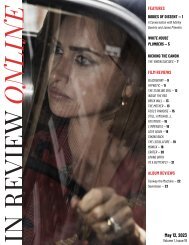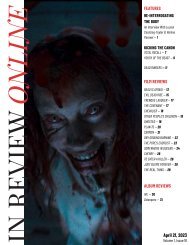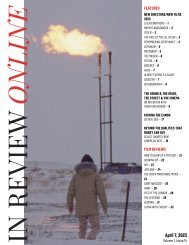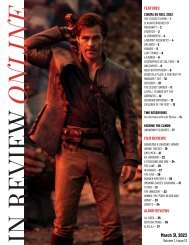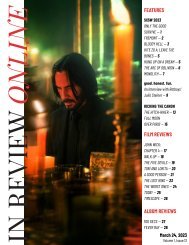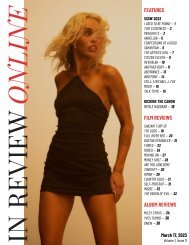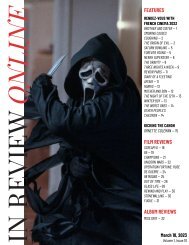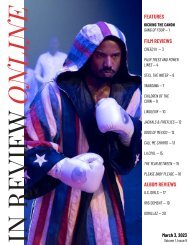You also want an ePaper? Increase the reach of your titles
YUMPU automatically turns print PDFs into web optimized ePapers that Google loves.
IN REVIEW ONLINE<br />
BEST ALBUMS<br />
OF <strong>2022</strong>
TOP 25 ALBUMS OF <strong>2022</strong><br />
It’s fitting that <strong>2022</strong> — as perhaps the first year that has felt in any way divorced from the Covid era we’ve all been slogging<br />
through, one in which normalcy has reclaimed some purchase in the micro <strong>of</strong> our day-to-day and macro <strong>of</strong> our cultural<br />
institutions — would be the year <strong>of</strong> the return. Queen Bey was back, in dialogue with the Queen <strong>of</strong> Disco herself, Donna Summer.<br />
Kendrick dropped yet another masterful album <strong>of</strong> shape-shifting aesthetics, one that powerfully reflects the introspection that<br />
captured so many minds over the past three years and channeled it into yet another sonic singularity. Drake sowed division<br />
amongst his fanbase with a push into deep house, but still reclaimed his crown as the people’s narcissist <strong>of</strong> choice after king cringe<br />
Elon became somehow cringier and Ye outed himself as a potentially lifelong Nazi apologist. Breakout favorite Black Country, New<br />
Road delivered their sophomore album, only to immediately split with lead singer Isaac Wood; Big Thief resumed duties after a few<br />
solo records made their mark last year; and mid-aughts Millennial favorites like Yeah Yeah Yeahs and Death Cab for Cutie proved<br />
they’re still legitimate players in the world <strong>of</strong> rock. Sure, not all returns were great — Taylor Swift delivered a mixed product with<br />
Midnights (though still an improvement on her irksome and remarkably overrated duo <strong>of</strong> folklore and evermore; note: this is not an<br />
opinion shared by all or even most <strong>of</strong> InRO’s writers, but I’m the one writing this, so everyone else can touch grass); Machine Gun Kelly<br />
obliterated any remaining goodwill he had from the pop pleasures <strong>of</strong> Tickets to My Downfall with the the whiniest album <strong>of</strong> the year;<br />
and The Lumineers returned with… just kidding, we didn’t listen.<br />
But rather than getting lost in a whorl <strong>of</strong> gloom, we at InRO choose positivity at this turnstile <strong>of</strong> <strong>2022</strong> and 2023, readying ourselves<br />
for more welcome returns as we all collectively climb out <strong>of</strong> the basement <strong>of</strong> politicized pandemics and back into the light.<br />
Over the past year, these 25 albums (plus some honorable mentions) have kept our glass half full. For that, we are thankful.<br />
1
#25 — DIFFERENT MAN<br />
Kane Brown<br />
In its very best moments, Different Man recalls nothing less than<br />
Brad Paisley's watershed American Saturday Night -- for how it<br />
traffics pop through a trad country landscape (lots <strong>of</strong> fiddle) and<br />
for how songs like "Riot" and "Bury Me in Georgia" hint at<br />
simmering contemporary sociopolitical tensions this genre<br />
usually won’t touch. But Kane Brown is, in a word, "different": He's<br />
not a genre innovator, not a conscious commentator; he's an<br />
almost inevitable insurgent, very much embedded in modern<br />
country, a practitioner <strong>of</strong> its forms and invested in its formulas,<br />
but possesses a level <strong>of</strong> emotional intelligence that allows him to<br />
elevate himself above country’s worst tendencies, trading<br />
arrogant machismo for a masculinity founded on gratitude and<br />
grace (principles that his wife reciprocates on their shimmering<br />
duet "Thank God," and that he even somehow gets Blake Shelton<br />
to credibly adopt on the album's title track). For this particular<br />
Brown album rollout, the immediate standout was "Grand," which<br />
isn't country at all, but rather a crystalline club-pop song with a<br />
hairline fracture: "The voices in my head used to make me wanna<br />
break down / Had me hella weighed down." As part <strong>of</strong> this<br />
primarily country program, the song is more than just a “pop<br />
experiment”; it’s an act <strong>of</strong> willful liberation from the stigmatism<br />
that a biracial country chart-topper faces when he dares<br />
embrace the full spectrum <strong>of</strong> his musical savvy.<br />
Succeeding on strength and intuitiveness <strong>of</strong> craft across<br />
different sub-genres is the foundational tenet <strong>of</strong> Different Man,<br />
whether it's the funky, R&B-inflected "See You Like I Do," the<br />
Brooks and Dunn-indebted (and featuring) "Like I Love Country<br />
Music," or the way the tipsy bossa nova <strong>of</strong> "Drunk or Dreamin'" or<br />
the interplay <strong>of</strong> EDM, hard rock, and a looped fiddle hook on "Go<br />
Around" provide musical articulation <strong>of</strong> their respective lyrics.<br />
Brown is capable <strong>of</strong> putting together a heartbreaker <strong>of</strong> a lovelorn<br />
ballad with some self-dismantling honesty worthy <strong>of</strong> George<br />
Jones ("I've never been a somber soul / But part <strong>of</strong> me ain't here no<br />
more"), and on this album's best-written song, "Pop's Last Name,"<br />
he can advocate with moving authority for families broken down<br />
by the pitfalls <strong>of</strong> a nation that the thinking country music fan<br />
could forgive him for loving just a little bit less. But as the<br />
bookending "Bury Me in Georgia" and "Dear Georgia" lay bare, he's<br />
full <strong>of</strong> too much gratitude (a worthy and underused word) for all<br />
that he's achieved and all that he's earned to cede any <strong>of</strong> his<br />
energies to bitterness. And that, too, is one <strong>of</strong> the very good and<br />
different things about him. — SAM C. MAC<br />
2
#24 — STARS AT NOON (OST)<br />
Tindersticks<br />
Despite being their ninth collaboration (either as a full band or<br />
individual members) with legendary French director Claire Denis,<br />
Tindersticks refuse lassitude, and seem determined to craft a<br />
distinct soundscape for each film. Whether it’s the lamenting and<br />
haunting baroqueness <strong>of</strong> Trouble Every Day, or the violent and<br />
oppressive synths <strong>of</strong> the score to the inexplicably dark Les<br />
Saluads, Tindersticks have consistently managed to create a<br />
sound that exquisitely matches the distinctive mood and style <strong>of</strong><br />
each successive film. Their latest work, the <strong>of</strong>ficial soundtrack<br />
for Denis’ new film Stars at Noon, is no different, once again<br />
lending the impression <strong>of</strong> reinvention and <strong>of</strong>ten sounding like an<br />
almost entirely different band to the one responsible for the<br />
aforementioned film scores.<br />
The Stars at Noon OST feels split into two styles: the first being a<br />
languid style <strong>of</strong> lounge jazz that lands with remarkable calm,<br />
while the second boasts a far more rhythmic flow that testifies to<br />
the film’s scattered bursts <strong>of</strong> urgency. Centered in the middle is<br />
the title track, the only sung instance <strong>of</strong> music on the record,<br />
which gives the impression <strong>of</strong> a climax that the previous songs<br />
may have been building up to. It’s an aching and melancholic<br />
piece, in function playing over a scene where the film’s two<br />
central lovers dance in a barren and dimly lit bar. It’s a sensuous<br />
experience, vocalist Stuart Staples’ voice and lyrics bearing a<br />
deep intimacy which invokes a flurry <strong>of</strong> emotions, even when<br />
detached from the film’s images. More than that, Tindersticks<br />
had this song — among others — ready for Claire to shoot the<br />
film to; the characters therein are directly dancing to the already<br />
existing music. Of course, the fact that the sonics and visuals<br />
line up so perfectly comes down to pure luck in some ways, but<br />
it’s also the thrilling result <strong>of</strong> a deep-rooted and artistic<br />
collaboration where placing trust in another has become second<br />
nature.<br />
Like the film (also featured in InRO’s <strong>Best</strong> Of declarations), it’s<br />
perhaps too easy to brush this OST album aside at first blush as<br />
an inessential minor work. Yes, it’s mostly comprised <strong>of</strong> short,<br />
instrumental jazz cuts that seem to drift by without much lasting<br />
weight. But the album’s power comes from how intoxicating<br />
these songs become, particularly in context with the film’s<br />
considerable heft, turning into something that is incredibly easy<br />
to return to over and over again. That’s especially true <strong>of</strong> the<br />
record’s title track, which is easily one <strong>of</strong> the finest Tindersticks<br />
songs <strong>of</strong> the past decade; it’s as raw and pr<strong>of</strong>ound as anything<br />
that has appeared on one <strong>of</strong> the group’s studio albums, and the<br />
final complete project is enhanced by the text — visual and<br />
narrative — that invigorates the final product.— OLIVER PARKER<br />
3
#23 — I WALKED WITH YOU A WAYS<br />
Plains<br />
The notion <strong>of</strong> “close harmony” is integral to many forms <strong>of</strong><br />
bluegrass and roots music, and it's an idea that seeps into<br />
every aspect <strong>of</strong> Plains’ I Walked With You A Ways. It isn't simply<br />
a matter <strong>of</strong> vocal harmony — though the intricacies <strong>of</strong> the<br />
vocal arrangements on standout tracks “Problem With It” and<br />
“Hurricane” are simply extraordinary — but <strong>of</strong> how narrative and<br />
songwriting voices intertwine. While Plains isn't billed as a proper<br />
supergroup or side project, such as the Allison Krauss & Robert<br />
Plant collaborations, it's noteworthy that Waxahatchee and Jess<br />
Williamson have approached this project as distinct from their<br />
own solo careers. Ultimately, that sense <strong>of</strong> harmony makes I<br />
Walked With You a Ways such a compelling listen that, in many<br />
ways, surpasses the very, very good work these two have done on<br />
their own.<br />
Williamson’s writing is more direct than that <strong>of</strong> Waxahatchee,<br />
who <strong>of</strong>ten deploys an ironic or narrative remove that insulates<br />
her narrators. Here, there is nowhere to hide on “Abilene” (“I<br />
remember the air when I drove out <strong>of</strong> town / Crying on the highway<br />
with my windows down”) or “Last 2 On Earth” (“Can’t tell nobody<br />
nothing, it’s a bright spark to ignite… You can take that sin to<br />
battle, but you can’t make it fight”), because the narrators are so<br />
blunt in their assessments <strong>of</strong> the failures they’ve either<br />
encountered or perpetuated. In contrast, Waxahatchee’s<br />
songwriting boasts a greater depth <strong>of</strong> detail than Williamson’s,<br />
and it’s those details — “a pink carnation, a hand hastily played” on<br />
“Problem With It,” or “a cigarette in a potted plant” on “No Record<br />
<strong>of</strong> Wrongs” — that make the minor and major traumas <strong>of</strong><br />
these stories stick. For both Williamson and Waxahatchee, then,<br />
their individual strengths and weaknesses interlock seamlessly<br />
like the pieces <strong>of</strong> a jigsaw puzzle. They complement each other<br />
in the best possible ways, and the album avoids the trap <strong>of</strong><br />
drawing too much attention to who contributed what because it<br />
all plays like an organic whole.<br />
I Walked With You A Ways is all the richer, then, for how an album<br />
borne <strong>of</strong> collaboration and partnership emerges as a chronicle <strong>of</strong><br />
doomed relationship upon doomed relationship. The cheery<br />
arrangement <strong>of</strong> opener “Summer Sun” belies the narrator’s<br />
intentions to leave her partner (“Honey, we’re up against<br />
something / Our love alone can’t fix”), while “Problem With It” is a<br />
far more direct kiss-<strong>of</strong>f (“If you can’t do better than that, babe / I<br />
got a problem with it,” is the kind <strong>of</strong> line that leaves a welt). The<br />
women given voice by Plains have all come to the realization that<br />
their relationships were never intended to be more than<br />
ephemeral comforts or distractions from deeper hurts and that,<br />
having walked alongside someone for a while, it’s time for them<br />
to move on to something more fulfilling. — JONATHAN KEEFE<br />
#22 — GOD’S COUNTRY<br />
Chat Pile<br />
On full-length debut God's Country, Oklahoma City sludge metal<br />
combo Chat Pile conjures nothing less than the political, social,<br />
and economic demons <strong>of</strong> life in America. "Wicked Puppet Dance"<br />
takes on drug addiction in the age <strong>of</strong> the opioid epidemic, while<br />
"Anywhere" delves into the relentless national nightmare <strong>of</strong> mass<br />
shootings. The quartet's songs are hellish vignettes <strong>of</strong> grief,<br />
despair, and injustice, given release through apocalyptic blasts<br />
<strong>of</strong> noise-laden metal fury. The tone <strong>of</strong> God's Country zigzags<br />
between grim, heightened realism and bleakly funny hysterics,<br />
like when a drug-fueled psychotic episode is interspersed with<br />
visions <strong>of</strong> a McDonald's mascot on punishing album closer<br />
"grimace_smoking_weed.jpeg." The album's reverb-y drums and<br />
comically distorted walls <strong>of</strong> guitar are ablaze with a fiery rage<br />
that seems at risk <strong>of</strong> veering into depressive detachment — not<br />
exactly an unfamiliar trajectory for people living life in a<br />
post-9/11, post-Trump, post-pandemic America. Consequently,<br />
4
lead singer Raygun Busch has no time for pretty metaphor or<br />
smart-ass symbolism: "Why do people have to live outside? / In the<br />
brutal heat or when it's below freezing / there are people that are<br />
made to live outside," he ominously deadpans on the<br />
anti-homeless screed "Why," repeating the titular adverb with<br />
increasingly unhinged desperation as the song goes on.<br />
day-to-day violence <strong>of</strong> the meat industry and the wider, and<br />
<strong>of</strong>ten unseen, institutionalized violence that has marked<br />
American life since its inception ("There's more screaming than<br />
you'd think"). Aside from the vicious slabs <strong>of</strong> sonic aggression, the<br />
band also trades in some quieter, more abstract atmosphere,<br />
like on the eerie "I Don't Care If I Burn," which echoes Shellac's<br />
#22 — GOD’S COUNTRY<br />
Chat Pile<br />
The band also confronts the sordid history <strong>of</strong> their hometown.<br />
"Open the safe in the back before more people die," sings Busch on<br />
"The Mask," chronicling a 1974 mass murder committed by Roger<br />
Dale Stafford with disturbing fidelity. Sung from the killer's POV,<br />
Busch likens the victims to animals, screaming for them to be<br />
lined up like lambs to the slaughter. Speaking <strong>of</strong>, the horrors <strong>of</strong><br />
slaughterhouses themselves are given an especially haunting<br />
treatment on the bluntly titled "Slaughterhouse." Recalling the<br />
twisted, bloody Americana <strong>of</strong> The Texas Chain Saw Massacre, the<br />
song not only gives voice to the animals who can't speak for<br />
themselves, but also draws parallels between the horrific<br />
infamous 2000 post-hardcore ballad "Prayer to God." Chat Pile<br />
concocts from noise rock, sludge, and industrial metal a brutal,<br />
crushing genre amalgam that, like the music that inspired it,<br />
manages to be both repulsive and alluring, the heinousness <strong>of</strong><br />
the subject matter only <strong>of</strong>fset by the group's own disgust at the<br />
stories they tell. "At first your hand was in mine / There, smiling<br />
and walking / Then the world split open / I think there was brain on<br />
my shoes," goes the first verse <strong>of</strong> "Anywhere" — the hope for a<br />
better world hasn't been extinguished yet, but if we’re to take the<br />
word <strong>of</strong> Chat Pile, it seems to drift further out <strong>of</strong> reach with each<br />
passing moment. — FRED BARRETT<br />
5
#21 — WET LEG<br />
Wet Leg<br />
Each <strong>of</strong> the last few years has had an album that is threatened to<br />
be swallowed whole by the discourse over how that album was<br />
written about in the popular press. In 2021, that was the fate <strong>of</strong><br />
Olivia Rodrigo’s SOUR, and in <strong>2022</strong>, it’s the self-titled debut from<br />
Wet Leg, who had the unmitigated gall to record the album in its<br />
entirety before they’d ever played a single live gig, much to the<br />
consternation <strong>of</strong> every remaining rockist who insisted that the<br />
duo was nothing more than a studio creation. To which I say:<br />
Thank God for the witchcraft <strong>of</strong> the modern recording studio and<br />
the Gen Z rejection <strong>of</strong> all <strong>of</strong> the “right” ways to go about creating<br />
music.<br />
What’s remarkable about Wet Leg is that it’s the work <strong>of</strong> an act<br />
who had very clearly put considerable thought and effort into<br />
their artistic identity right from the jump, rather than growing<br />
into that sense <strong>of</strong> self over the course <strong>of</strong> several albums or long<br />
stints on the road. Culling the best parts <strong>of</strong> the indie scenes <strong>of</strong><br />
the ‘90s and aughts for their sonic palette, Rhian Teasdale and<br />
“What’s remarkable about Wet<br />
Leg is that it’s the work <strong>of</strong> an<br />
act who had clearly put<br />
considerable thought and<br />
effort into their artistic<br />
identity.<br />
Hester Chambers demonstrate the kind <strong>of</strong> fluency with genre<br />
that allows them to flaunt convention. There are overt nods to<br />
David Bowie — “I Don’t Wanna Go Out” notably pulls the guitar riff<br />
from Bowie’s “The Man Who Sold The World” to brilliant effect —<br />
and more subtle homages to acts like Dig Me Out-era<br />
Sleater-Kinney (“Chaise Longue”) and The Bottle Rockets and<br />
Rock-A-Teens (“Loving You”).<br />
The shifts in tone and aesthetic are purposeful and playful, and<br />
they’re always fully in service to what works for a particular<br />
song. It’s that playfulness that seemed to make Wet Leg so<br />
confounding to the Boomer set; as with Rodrigo’s extraordinary<br />
debut album, they just couldn’t reconcile their rigid constructs<br />
with music that was so clearly not for them. And the album is,<br />
above all else, fun. The non-sequiturs and Mean Girls quotes <strong>of</strong><br />
“Chaise Longue,” the well-rehearsed scream <strong>of</strong> “Ur Mom,” and the<br />
ribald put-downs <strong>of</strong> “Wet Dream” are all delivered with such a<br />
wry, arch tone — mostly by Teasdale — that it’s easy to<br />
misinterpret the intention as Wet Leg not taking their music<br />
seriously. But what actually makes Wet Leg so indelible is how the<br />
duo clearly recognizes that their irreverence is very serious<br />
business, indeed. — JONATHAN KEEFE<br />
#20 — BAD MODE<br />
Hikaru Utada<br />
Life has done a lot <strong>of</strong> pausing in the last couple years. Most <strong>of</strong><br />
those pauses have been bleak, but Hikaru Utada’s Bad Mode is a<br />
record that finds beauty and opportunity in quietness. Across the<br />
LP’s tracks, Utada reflects on a search for purpose and the<br />
delicacy <strong>of</strong> relationships over gossamer-light electronic<br />
production. On the title track, they vow to stick around for a<br />
partner even in their low moments, mixing <strong>of</strong>fers to indulge in<br />
simple comforts like ordering delivery with moving emotional<br />
declarations (“Even when it’s hard to believe that better days are<br />
coming / I’m here for you”). The music matches these shifts<br />
between worry and everyday intimacy on “Bad Mode”: the gentle<br />
funkiness <strong>of</strong> the first two choruses gives way to a watery, spacey<br />
interlude, then returns to the groove with the addition <strong>of</strong> playful<br />
trumpets. “Hope I don’t fuck it up again,” they shrug in the closing<br />
lines; not pessimistic, just used to uncertainty.<br />
The transition in “Bad Mode” is prompted by the lyric, “How many<br />
times did I question myself? / Is it this scary for everyone else<br />
too?” Single “Pink Blood,” then, considers similar ideas <strong>of</strong><br />
personal growth and learning to trust yourself, as Utada<br />
concludes, “I should stop working hard at something that doesn’t<br />
serve me / I don’t need to show it to anyone for something<br />
beautiful to be beautiful.” “Kimini Muchuu” and the bouncy “Find<br />
Love” also tackle insecurity through this lens <strong>of</strong> romantic<br />
6
entanglement, and the music remains consistently beautiful,<br />
tender, and restrained throughout. It will make sense to longtime<br />
fans, as Utada is the sole songwriter for most <strong>of</strong> the project, with<br />
co-production coming courtesy <strong>of</strong> Nariaki Obukuro, A.G. Cook,<br />
and Floating Points (who is responsible for the record’s longest,<br />
most hypnotic songs). Skrillex also shows up credited on “Face<br />
My Fears,” though the Kingdom Hearts III theme song is<br />
admittedly done a disservice in this context: its future bass<br />
chorus feels out <strong>of</strong> place amid so much twinkly electropop, but<br />
it’s worth noting only to state that the A.G. Cook remix is an<br />
excellent substitute.<br />
The album’s boldest musical statement is closer “Somewhere<br />
Near Marseilles,” which remains remarkably down-to-earth<br />
despite being an almost 12-minute epic. Utada plans a casual<br />
hotel rendezvous — all they want is “a spot with easy access,” “a<br />
room with a view,” and each other — while the music unspools<br />
into a shifting arrangement equally as suited for dancing as it is<br />
for laying around the house on a lazy Sunday morning. It’s a<br />
thoughtful conclusion to a set <strong>of</strong> songs that balance patience<br />
with conviction, as they explore when to work toward love and<br />
self-worth, when to pull back from something beyond one’s<br />
control, and when to commit it all in defense <strong>of</strong> the things that<br />
give life meaning. On “One Last Kiss,” Utada sings, “I love you<br />
more than you’ll ever know”—but even just trying to say it means<br />
everything.— KAYLA BEARDSLEE<br />
#19 — ASPHALT MEADOWS<br />
Death Cab for Cutie<br />
A venerable indie rock institution, Death Cab for Cutie is many<br />
things to many people. For millennials <strong>of</strong> a certain vintage, they<br />
are a conduit <strong>of</strong> CD-era nostalgia. For casual fans who still have<br />
“Soul Meets Body” on their dinner party playlist, they are reliable<br />
purveyors <strong>of</strong> earnestness and emotional acuity. And since the<br />
departure <strong>of</strong> founding member Chris Walla, they have seemed,<br />
increasingly, a platform for singer/songwriter Ben Gibbard,<br />
whose breakup with Zooey Deschanel provided the subtext for a<br />
couple <strong>of</strong> the band’s more languid affairs.<br />
It’s been a while since Death Cab for Cutie actually felt like a<br />
band, an entity whose sound is summoned from the chemistry<br />
and interplay <strong>of</strong> its individual members, whose distinctions lie in<br />
more than just the personality <strong>of</strong> their lead singer. That changes<br />
with Asphalt Meadows, which is less a return-to-form than a<br />
flat-out late-career renaissance. Their most engaging record<br />
since Transatlanticism, Asphalt Meadows is vigorous, tense, and<br />
visceral. When is the last time this band worked up a full head <strong>of</strong><br />
steam the way they do on the driving “I Miss Strangers,” or flirted<br />
with abrasion like they do on the aptly-named “Roman Candles?”<br />
When’s the last time they locked into a head-bobbing beat like<br />
the one that powers the title song, or seemed as adventurous as<br />
they do on the fractured “Foxglove Through the Clearcut?”<br />
Asphalt Meadows is the work <strong>of</strong> a band that has long mastered<br />
tone and texture, but here remembers how much fun it is to stir<br />
up a ruckus together. Perhaps it’s inevitable that their newfound<br />
vim is pent-up pandemic antiness, something that’s also<br />
reflected in Gibbard’s lyrics. The album opens with a song called<br />
“I Don’t Know How I Survive,” its <strong>of</strong>f-handed despair setting the<br />
tone for songs that are by turns nervous, wistful, and resolute.<br />
“Rand McNally” is shameless in its nostalgia, and all the more<br />
affecting because <strong>of</strong> it; meanwhile, “I Miss Strangers” reckons<br />
honestly with the displacing effects <strong>of</strong> quarantine. And then<br />
there’s the final song, which thumps, thuds, and lurches,<br />
sounding wizened and confident. It’s called “I’ll Never Give Up on<br />
You,” which <strong>of</strong>fers a reassurance that the band’s wrestling match<br />
with despair has concluded, at least for now, with some kind <strong>of</strong> a<br />
truce. — JOSH HURST<br />
7
#18 — SHEBANG<br />
Oren Ambarchi<br />
There is a duality at the heart <strong>of</strong> Oren Ambarchi’s music. There’s<br />
Oren Ambarchi the performer, a totally unique guitarist who plays<br />
in free improvised settings with the likes <strong>of</strong> Keiji Haino, Jim<br />
O’Rourke, Keith Rowe, and Stephen O’Malley. And then there is the<br />
Oren Ambarchi <strong>of</strong> the studio, a sort <strong>of</strong> modern Teo Macero,<br />
constructing these towering long-form works out <strong>of</strong> bits and<br />
pieces recorded at different times by disparate ensembles. His<br />
pair <strong>of</strong> releases this past year exemplifies that duality: there’s<br />
Ghosted, a semi-improvisational trio performance with bassist<br />
Johan Berthling and drummer Andreas Werliin that was recorded<br />
live, in a single room, with minimal overdubs; and then there’s<br />
Shebang, which features an extensive cast <strong>of</strong> guest performers,<br />
recorded all over the world over the course <strong>of</strong> five years, and<br />
meticulously edited into a 35-minute piece. Remarkably, both<br />
sides <strong>of</strong> Ambarchi’s musical practice share a unified, easily<br />
identifiable sound, but it’s fascinating that the respective<br />
methods <strong>of</strong> arriving at that sound are completely opposed.<br />
Ambarchi’s career arc also has a binary quality: we can divide his<br />
solo discography rather cleanly into pre- and post-“Knots.” That’s<br />
not a quality judgment (records like Grapes From The Estate<br />
[2004] or In The Pendulum’s Embrace [2007] remain classics); it’s<br />
just that all <strong>of</strong> his studio work in the last decade seems part <strong>of</strong> a<br />
distinct lineage that can be traced back to the epic 33-minute<br />
track that dominated his 2012 record Audience Of One. “Knots” is<br />
built around the skittering ride cymbal work <strong>of</strong> Joe Talia, which<br />
acts as an uneven pulse propelling the piece forward. From<br />
there, Ambarchi layers various sounds — strings, horns,<br />
processed voices — and gradually builds them into a massive<br />
droning crescendo, with his own cacophonous guitar soloing over<br />
the top. It’s fairly simple, but in Ambarchi’s hands, the effect is<br />
completely mesmerizing, and it’s provided a basic formula from<br />
which he’s worked out all sorts <strong>of</strong> variations.<br />
If any single emphasis can define Ambarchi’s post-“Knots” work,<br />
it’s a fascination with rhythm. Sagittarian Domain, Quixotism,<br />
Simian Angel: each <strong>of</strong> these records is in one way or another a<br />
sort <strong>of</strong> exploratory rhythmic study, investigating and expanding<br />
8
on ideas culled from Outside The Dream Syndicate to minimal<br />
techno to Brazilian percussion masters like Nana Vasconcelos.<br />
And along with the heavier and more Krautrock-indebted Hubris<br />
from 2016, Shebang is probably his most rhythmically intricate<br />
record. It begins with a lone electric guitar picking a wonky<br />
pattern, though it soon splits into multiple voices, which weave<br />
around each other in a way that recalls Pat Metheny’s<br />
performance <strong>of</strong> Steve Reich’s Electric Counterpoint. As the guitar<br />
layers continue to build gradually, along with some added bass<br />
tones, Talia enters on drums, his colorful cymbal work<br />
reminiscent <strong>of</strong> one <strong>of</strong> Ambarchi’s heroes, Jack DeJohnette. As<br />
the piece unfurls, its complex rhythms gradually shifting and<br />
evolving, it becomes something <strong>of</strong> a sequence <strong>of</strong> solo spots. B.J.<br />
Cole on pedal steel, Chris Abrahams on piano, Julia Reidy on<br />
12-string guitar, Jim O’Rourke’s synthesizer drone — they each<br />
get a moment in the spotlight. And then, as the piece reaches its<br />
climax, it sounds as if many (if not all) <strong>of</strong> the featured soloists<br />
make their return, massing together to form a single, shimmering<br />
cloud <strong>of</strong> sound.<br />
Many <strong>of</strong> Ambarchi’s touchpoints — classical minimalism, ’70s and<br />
’80s ECM-style jazz fusion, krautrock, and Berlin school electronic<br />
— are genres and movements that feel firmly rooted in very<br />
specific time periods, but he is able to bring those sounds into<br />
the present in a way very few <strong>of</strong> his contemporaries can. For all<br />
<strong>of</strong> its historical references, Shebang still manages to feel<br />
downright modern. — BRENDAN NAGLE<br />
#17 — AETHIOPES<br />
billy woods<br />
billy woods’ vivid, theatrical approach to rap storytelling reached<br />
its apex this year with Aethiopes, a full-length collaboration with<br />
producer and tour DJ Preservation. The record caps <strong>of</strong>f a decade<br />
<strong>of</strong> writerly exercises beginning with 2012’s History Will Absolve Me,<br />
whose shrapnel-like soundscapes seemed to capture the end <strong>of</strong><br />
history while reckoning with its buried truths. woods’ releases in<br />
the years since — comprising solo albums, a sustained<br />
collaboration with Elucid as Armand Hammer, and an excellent<br />
one-<strong>of</strong>f with Moor Mother in 2020 — have mined similar subjects<br />
with impressive results, though only occasionally crossing over<br />
with non-rap listeners (as on 2019’s Hiding Places and 2021’s<br />
Haram). Aethiopes mints woods as a mainstay among this fickler<br />
indie crowd, while also positioning the rapper as an unexpectedly<br />
persuasive nexus point between the past and present eras <strong>of</strong><br />
NYC rap music. Members <strong>of</strong> early-2000s record label Def Jux and<br />
the Weathermen share space with newer rappers on the abstract<br />
fringes, and boom bap hero Boldy James even makes a welcome<br />
appearance. The record’s larger chorus lends woods the quality<br />
<strong>of</strong> protagonist as well as author, and Preservation’s<br />
sample-heavy smorgasbord weaves woods into Aethiopes’ other<br />
voices and sounds, creating a diasporic tapestry <strong>of</strong> collective<br />
identity.<br />
Aethiopes announces its sweeping aspirations early with opener<br />
“Asylum,” on which discordant piano and woodwinds soundtrack<br />
an imaginative child’s theories about a neighbor in political exile.<br />
woods’ usual attention to detail is especially pronounced, his<br />
narrator (who may or may not be billy woods himself) tracking<br />
daily routines next door and little changes in the crumbling<br />
facade <strong>of</strong> normalcy. Aethiopes is peppered with moments <strong>of</strong> such<br />
exactitude in identifying global dispossession, tracing not just<br />
people but objects like Queen Elizabeth’s Ashanti gold necklace<br />
(“Harlem”) and rooms full <strong>of</strong> Incan treasure (“Remorseless”). With<br />
lyrics that abruptly transverse childhood and adulthood — and<br />
imagine the far future on the grimy “NYNEX” — listening to<br />
Aethiopes can give the impression not just <strong>of</strong> a work greater than<br />
the sum <strong>of</strong> its parts, but one whose sheer number <strong>of</strong> parts<br />
overwhelms. Yet Preservation’s cinematic backdrop ensures that<br />
the clamor is never anything less than artfully unpolished,<br />
enveloping the game <strong>of</strong> rapper hot potato “Heavy Water” with<br />
searing percussion, and pairing woods’ diary scrawls with blaring<br />
horns on “No Hard Feelings,” elevating the album highlight to<br />
apocalypse-level urgency. Closing track “Smith + Cross”<br />
concludes Aethiopes with a moment <strong>of</strong> poetic self-recognition in<br />
a museum diorama, woods in effect identifying himself within<br />
both his lineage and its historicization. Few other <strong>2022</strong> albums,<br />
rap or otherwise, collected worlds within worlds with comparable<br />
heft or grandeur. — MICHAEL DOUB<br />
9
#16 — SOS<br />
SZA<br />
Take a look around at some other year-end music lists and you’ll<br />
quickly realize just how much there’s still an appetite for the type<br />
<strong>of</strong> <strong>of</strong>f-kilter, understated R&B that SZA nailed so perfectly on her<br />
critically and commercially celebrated 2017 breakthrough Ctrl. So<br />
give the last real star on Top Dawg’s roster some credit for having<br />
the fortitude to record an hour-plus album this breathlessly<br />
eclectic and inventive, this insistent on flexing its artist’s range<br />
rather than playing in the pocket. The first proper song on SOS<br />
sets the table, and anticipates a smorgasbord: “Kill Bill” is equal<br />
parts sweet and squirmy, with fluttering falsetto and trips to the<br />
farmer’s market sharing space with a chronically shifty drum<br />
machine and multiple murder plots. It may have been Mountain<br />
Goats mastermind John Darnielle who formally declared that his<br />
<strong>2022</strong> album was “inspired” by action movie plotting, but SZA’s<br />
writing on SOS also draws heavily on the heightened emotional<br />
and narrative stakes found in a broad range <strong>of</strong> genre films. On<br />
the surface, the album’s tales <strong>of</strong> romantic misadventure, messy<br />
breakups, and lingering jealousies may not be too far afield from<br />
those <strong>of</strong> Ctrl, but the cinematic breadth <strong>of</strong> the production<br />
punches up the drama, and<br />
proves the perfect backdrop for the various narrator’s<br />
sensationalized antics.<br />
The girl on “Shirt” wears bloodstains from a run-in with a bitch<br />
who got on her nerves like a badge <strong>of</strong> honor, while the one on<br />
“Seek & Destroy” likens her lovelorn pursuit to “the art <strong>of</strong> war” and<br />
is serious enough about it to have “missiles deployed.” Sometimes<br />
we find even an ostensibly happy heroine, like the one <strong>of</strong><br />
“Snooze,” still “mobbin', schemin', lootin’, and hidin’ bodies.” That<br />
the more aggressive songs here sit unassumingly alongside<br />
swooning romantic gestures like Travis Scott duet “Open Arms”<br />
and the gorgeous, countrified Mazzy Star homage “Nobody Gets<br />
Me” speaks less to any incoherence <strong>of</strong> concept than it does to<br />
SZA’s all-encompassing vision. The sprawl <strong>of</strong> SOS plays like a<br />
whole summer season <strong>of</strong> blockbusters, and a few breakout indies<br />
(the low-key character study <strong>of</strong> “Blind” being a major highlight),<br />
stuffed into one uncommonly generous album. And even at its<br />
most marquee-ready, SOS never sacrifices the idiosyncratic<br />
approach to writing that endeared so many to this artist in the<br />
first place. SZA’s feel for young women’s anxieties, insecurities,<br />
but also their sources <strong>of</strong> strength, independence, and<br />
individuality, is as strong as ever, and feels even more assertive<br />
and culturally consequential in this wide-screen format than it<br />
did on her debut. — SAM C. MAC<br />
10
11<br />
#15 — BOAT SONGS<br />
MJ Lenderman<br />
On "TLC Cagematch," the third song on MJ Lenderman's<br />
breakthrough album Boat Songs, the singer-songwriter<br />
sorrowfully reflects on the passage <strong>of</strong> time while watching pro<br />
wrestling in his living room. "I always believed it, every time you<br />
said you're gonna be like our hero someday / Well, baby, all our<br />
heroes now are dead, 'cause all things go," he sings, his lilt<br />
drenched in the same melancholy that made Jason Molina an<br />
alt-country icon. Much like Molina's early material as Songs: Ohia,<br />
Lenderman fuses dusty country fables with sparse indie rock<br />
production, although his rural vignettes also share a lot in<br />
common with the arboraceous solipsism <strong>of</strong> Will Oldham's<br />
numerous musical identities. After two firmly DIY releases —<br />
2019's sprawling, self-titled debut and last year's hazy Ghost <strong>of</strong><br />
Your Guitar Solo — the Asheville musician's latest ascends into<br />
higher fidelity, while still maintaining the homespun<br />
straightforwardness that gave those previous records their<br />
rough-around-the-edges coziness.<br />
Boat Songs represents a sort <strong>of</strong> middle ground between the<br />
ambitious opuses <strong>of</strong> his first LP and the Guided by Voices-esque<br />
minimalism <strong>of</strong> his second, and whether his denim-and-flannel<br />
drawl is tangling with laid-back guitar strums or pushing through<br />
walls <strong>of</strong> distortion, Lenderman's gentle songwriting sensibility<br />
lends itself just as easily to tales <strong>of</strong> NBA legends (allegedly)<br />
playing through a hangover ("Hangover Game") as it does to<br />
folksy aphorisms (the refrain <strong>of</strong> "Don't remind me, what I already<br />
know" on the balladic album highlight "Under Control"). On the<br />
fuzz-laden "SUV," he amplifies snapshots <strong>of</strong> post-breakup<br />
awkwardness with punk rock urgency before ultimately planting<br />
his sad sack in front <strong>of</strong> the TV just like he did two songs earlier.<br />
The funereal slowcore <strong>of</strong> album closer "Six Flags" breaches<br />
similar thematic territory to even more devastating results ("No<br />
one could notice / I have never / felt alone / the way I did / at the<br />
Six Flags over Texas"), Lenderman finishing the record <strong>of</strong>f with a<br />
tar-spitting guitar solo.<br />
There is an immediate, uncomplicated beauty to Boat Songs, one<br />
where the simple pleasures <strong>of</strong> Jackass aren't given more or less<br />
weight than memories <strong>of</strong> happy summers spent getting wasted<br />
and loafing around drained swimming pools. It's about going<br />
through life, failing, falling, getting back up again, and finding<br />
some happiness along the way. Fame, beauty, and youth all fade<br />
eventually, but so does pain, and so does sadness. We're all just<br />
trying our best: "And that's why we do what we gotta do to get<br />
through / And I know life will make us crazy, I do." — FRED<br />
BARRETT
#14 — IT’S ALMOST DRY<br />
Pusha T<br />
Virginia rap legend Pusha T's hotly anticipated fourth LP It's<br />
Almost Dry opens with the ghostly keys <strong>of</strong> "Brambleton," a<br />
Pharrell-produced introduction which sees the 44-year-old<br />
rapper exploring the fractured relationship with his former<br />
manager Anthony "Geezy" Gonzales. It's a deeply personal way to<br />
open an album, especially coming from an MC most famous for<br />
braggadocious bars about slinging cocaine. "It was sad watching<br />
dude in Vlad interviews . . . Had a million answers, didn't have a<br />
clue, why Michael kissed Fredo in Godfather II," spits King Push,<br />
referencing his former confidant's infamous interview with DJ<br />
Vlad. In spite <strong>of</strong> allowing himself some vulnerability, his flow<br />
remains as assured as ever, and when he spins a drug-dealing<br />
tale on the follow-up track "Let the Smokers Shine the Coupes,"<br />
his presence becomes unmistakable. It's not just Pharrell who<br />
gets to leave his fingerprints all over the record, however, as the<br />
other half <strong>of</strong> the 12-song tracklist is produced by none other than<br />
a pre-heel turn Ye, his collaborations with Pusha having proven<br />
fruitful since 2005. Contrasting Pharrell's eerie beats with clipped<br />
and pitched-up soul samples, "Dreamin <strong>of</strong> the Past" and the<br />
engrossing "Rock n Roll" also see the controversial<br />
rapper-producer make time to drop two verses <strong>of</strong> his own.<br />
It's Almost Dry not only boasts an impressive sonic variety but<br />
also a rogue’s gallery <strong>of</strong> guest MCs. Jay-Z, Kid Cudi, and Lil Uzi<br />
Vert all feature on the album, adding some additional star power<br />
to the proceedings. Jay-Z's verse on "Neck & Wrist" stands out in<br />
particular for containing some <strong>of</strong> the New York rapper's best<br />
rhymes in a long time ("I blew bird money, y'all talkin' Twitter<br />
feed/We got different Saab stories, save your soliloquies"). The<br />
LP's best moment might come at the very end, though, in the<br />
form <strong>of</strong> album closer "I Pray for You." Produced by Labrinth and<br />
Ye, the track's soul-tinged plaintiveness and organ-heavy<br />
instrumentation make for a reflective, somber finale. Pusha raps<br />
about his accomplishments with<br />
lines like, "Rarely do you see the<br />
Phoenix rise from the<br />
ashes/Lightnin' struck twice on<br />
four classics," celebrating both his<br />
history and reunion with his<br />
brother and former Clipse partner,<br />
No Malice, who also appears on<br />
the song (and refers to himself as<br />
Malice for the first time since<br />
2012). Even with his prominent<br />
guests, it's clear that few rappers<br />
can match Pusha's lyricism, and<br />
his most boastful<br />
rhymes make it clear that he is keenly aware <strong>of</strong> that fact<br />
("Service with a smile when I hand out halos"). Still, it's the<br />
moments <strong>of</strong> quiet doubt and lingering regrets that resonate long<br />
after the album has faded into silence. — FRED BARRETT<br />
#13 — CREST<br />
Bladee & Ecco2k<br />
Those in need <strong>of</strong> religion in <strong>2022</strong> could do no better than to join<br />
the cult <strong>of</strong> Drain Gang. Despite being an outfit that appeals more<br />
to a hyper-online Zoomer generation, it’s actually tough <strong>of</strong>f the<br />
top to come up with a more sincere project out there, the<br />
collective’s post-irony leanings making for consistently gentle<br />
records from the quintet <strong>of</strong> Bladee, Ecco2K, Thaiboy Digital, Yung<br />
Sherman, and Whitearmor. Despite arriving at a similar cultural<br />
12
and artistic moment and occupying shared aesthetic space as<br />
other SoundCloud hip hop cum hyperpop cum emo rap groups<br />
like Goth Boi Clique or 100 Gecs, Bladee and co. have created<br />
distance from those projects on the strength <strong>of</strong> their easy<br />
ebullience and throwback peace-and-love optimism. Rather than<br />
saturating their efforts in #sadboi hedonism or crafting them for<br />
maximum wink value, Drain Gang consistently (and increasingly)<br />
feels untethered from such trivial terrestrial concerns — they<br />
may be in this world, but they’re not <strong>of</strong> it.<br />
In that sense, then, Crest may be<br />
the spiritual album <strong>of</strong> the year, and<br />
intentionally so. But unlike the<br />
album that angled for and indeed<br />
took on that mantle in 2021, these<br />
young bucks aren’t likely to out<br />
themselves as Hitler apologists in<br />
the coming year. That’s in no small<br />
part because none <strong>of</strong> the toxic<br />
dogma <strong>of</strong> Christianity rears its ugly<br />
head on Crest, despite playing<br />
loose with such iconography and<br />
language on these tracks — “Gloria<br />
in excelsis, Deo, Deo / Excelsior, we<br />
excel everything and anything” on “5 Star Crest (4 Vattenrum)”;<br />
“Everlasting / Flowers bloom / Never-ending / Story <strong>of</strong> my life /<br />
Ballad for the sins” on “Girls just want to have fun” — and instead<br />
the prevailing ethos is <strong>of</strong> a far more zenned-out Buddhist variety<br />
(“We think we exist / that’s why we suffer”), celebrating community<br />
and kinship, the pursuit <strong>of</strong> beauty and nirvana. On Crest, the fog<br />
<strong>of</strong> abstraction is its own kind <strong>of</strong> heaven.<br />
All <strong>of</strong> this psychedelic-tinged earnestness, spiritually descended<br />
from the ‘60s folk scene more than anything, swirls within<br />
Whitearmor’s twinkly EDM noodling, layered to the point <strong>of</strong><br />
appealing chaos, foregrounding the early house at its core when<br />
it’s not fulling leaning into the sonics <strong>of</strong> anime soundtracking,<br />
while at other times stripping things back to highlight the<br />
influence <strong>of</strong> something like early-aughts, nu-hippie oddity<br />
Nanook <strong>of</strong> the North’s The Taby Tapes. Of course, the collective<br />
has been perfecting this formula for a decade at this point, their<br />
interpolation <strong>of</strong> a more keenly observed spirituality becoming<br />
increasingly refined with each successive effort (and it’s worth<br />
noting that this likewise applies to Bladee’s solo effort this year,<br />
Spiderr). But what stands out most in <strong>2022</strong> — a year that saw<br />
some <strong>of</strong> the world’s biggest stars and clearest voices detour into<br />
the history-rich world <strong>of</strong> carnal club music — is how truly pure<br />
and redeeming this humble Swedish outfit is to our troubled<br />
world. And all Drain’s people said, amen. — LUKE GORHAM<br />
#12 — ANTS FROM UP THERE<br />
Black Country, New Road<br />
It’s quite exciting and a little surprising to take stock <strong>of</strong> how<br />
young Cambridgeshire septette Black Country, New Road —<br />
whose members are still roughly in their early 20s, though they<br />
are now <strong>of</strong>ficially a sextette after lead singer Isaac Wood’s<br />
departure — so naturally and briskly reinvented their music since<br />
the release <strong>of</strong> their 2021 breakthrough debut record, For the First<br />
Time. Without entirely disavowing the the core characteristics<br />
and distinctive sounds <strong>of</strong> that impressive album, BCNR does<br />
depart somewhat from that post-punk style and those Tool-ish<br />
effects on Ants From Up There, embracing the much more<br />
explicitly the prog rock influences <strong>of</strong> prominent British groups <strong>of</strong><br />
the ‘70s — a luscious hodgepodge <strong>of</strong> Gentle Giant, King Crimson,<br />
13
and Van der Graaf Generator, as well as so-called Canterbury<br />
scene acts like Caravan and S<strong>of</strong>t Machine — and reinterpreting to<br />
edgier and more modern effect: (“She had Billie Eilish style /<br />
Moving to Berlin for a little while”). As much as the title <strong>of</strong> the<br />
album itself suggests a certain surreal, maybe even Dadaist<br />
quality (“So clean your soup maker and breathe in / Your chicken<br />
broccoli and everything”), sometimes even recalling Syd Barrett’s<br />
psychedelic dwams, when it comes to the group’s outlandish<br />
lyricism, it’s as if random recollections <strong>of</strong> memory or scattered<br />
excerpts from a diary have been plucked for us: “This staircase —<br />
it leads only to / Some old pictures <strong>of</strong> you”). On the other hand,<br />
BCNR’s poetic musings can also take more conceptual shape,<br />
twining romantic concerns, fantastical reveries, and even<br />
domesticity — “And every phone died then / And no-one had WiFi<br />
inside your apartment, from “Bread Song”; “Concorde flies in my<br />
room / Tears the house to shreds,” from “Basketball Shoes” —<br />
which feels like a potential instance <strong>of</strong> our post-pandemic era’s<br />
inclination toward blending mundane minutiae with sublime<br />
beauty.<br />
Extending this notion, it also seems that the album’s inflections —<br />
especially when we consider how much Wood’s timbres are owed<br />
to the singular vocal expressions and performances <strong>of</strong> David<br />
Bowie, most notable in “Chaos Space Marine” — intend to create a<br />
specific soundscape for listeners’ perceptions and imaginations<br />
rather than necessarily convey any clear meaning: take “Snow<br />
Globes,” for example: “A small nation <strong>of</strong> souvenirs / Make Henry<br />
whole but porously / Oh, god <strong>of</strong> weather, Henry knows / Snow<br />
globes don’t shake on their own.” As Wood’s vocals, alternately<br />
placid and psyched-out from one song to the next, attempt to<br />
extract the essential musicality <strong>of</strong> the words, the band’s<br />
instrumentation delivers the most expressive and impressive<br />
sounds as a canvas for listeners. It’s particularly remarkable to<br />
hear Georgia Ellery’s strings, Lewis Evans’ flutes & saxophone,<br />
and May Kershaw’s keyboards and percussions entwine the<br />
tracks’ colorful emotions with expectedly more pensive post-rock<br />
structures laid down by Luke Mark, Tyler Hyde, and Charlie<br />
Wayne’s guitar, bass, and drum trio. And so, as kaleidoscopic and<br />
unpredictable as Ants from Up There proves to<br />
14
Be (as only a sophomore record, at that), it’s tough not to already<br />
be looking forward — given how artistically open-minded BCNR<br />
has proven to be — to where exactly these curious rockers<br />
choose to go next. — AYEEN FOROOTAN<br />
#11 — PREACHER’S DAUGHTER<br />
Ethel Cain<br />
Ethel Cain’s debut album, Preacher’s Daughter, soared onto the<br />
scene in <strong>2022</strong> (on the heels <strong>of</strong> her incredibly popular EP in 2021),<br />
firmly entrenching her as a new indie darling du jour. Moving<br />
beyond the world <strong>of</strong> TikTok stardom and late-stage bedroom pop<br />
aesthetics, Cain rips into the heart <strong>of</strong> middle America’s<br />
depressive tendencies. While such thematizing would feel forced<br />
from a lesser artist, there’s a real camaraderie in these sweeping<br />
sounds that primes the record to easily steal the hearts <strong>of</strong><br />
flyover country listeners in particular. There’s a tone <strong>of</strong> deep<br />
knowledge that informs the emotionally resonant content, a dual<br />
force that sustains the lengthy runtime <strong>of</strong> the album. Clocking in<br />
at just under 80 minutes, it’s nearly a miracle how well this<br />
works, succeeding so thoroughly with an approach that might<br />
seem antithetical to the fast pace and limited attention span <strong>of</strong><br />
the artist’s core fanbase.<br />
There’s always something bubbling on the edge <strong>of</strong> Preacher’s<br />
Daughter’s tracks, tense instrumentals fusing with smooth vocals<br />
so that it feels like the songs could explode at any moment. It<br />
shows an immense amount <strong>of</strong> restraint to avoid following<br />
through on that, but taking the long way around on the tracks<br />
pays <strong>of</strong>f immensely. Tracks expand far beyond what Cain’s typical<br />
pop counterparts would choose, instead opting for sprawling<br />
seven-minute takes that dive into the depths <strong>of</strong> what it feels like<br />
to be alive. It’s an ambitious approach for such a new artist, but<br />
refreshing within the sea <strong>of</strong> similarity to which the album was<br />
dropped. Cain’s Southern Baptist upbringing created the<br />
framework for the album’s various pieces: cuts here are sonically<br />
reminiscent <strong>of</strong> hyper-religious ballads and contemporary praise<br />
songs that are so common in Cain’s neck <strong>of</strong> the woods, but she<br />
approaches this template with a vein <strong>of</strong> darkness: the impression<br />
can <strong>of</strong>ten feel like a church service led<br />
by Lana Del Rey. The lyrics are a foil to this facade <strong>of</strong> worship,<br />
instead speaking with contempt about the American Dream that<br />
failed so many around her, notably on the rare uptempo track,<br />
single “American Teenager.” The systems Cain condemns have<br />
failed the people that they were designed to protect, many <strong>of</strong><br />
whom reside in the small towns that the artist uses as<br />
perspective on the album.<br />
“… the impression can <strong>of</strong>ten<br />
feel like a church service led<br />
by Lana Del Rey.<br />
Like the designed languor <strong>of</strong> a litany, Preacher’s Daughter’s<br />
pacing affects the listener, making them feel as if they are being<br />
consumed by the world and word. Cain <strong>of</strong>fers a glimpse inside<br />
the challenging reality <strong>of</strong> a nation torn apart by religious zealotry,<br />
foreign wars, an ongoing opioid crisis, and crippling depression,<br />
and asks listeners to sit inside this space. As the album<br />
progresses, these forces build, and challenge the very notion <strong>of</strong><br />
artistic creation in such a world. Through the ashes, Ethel Cain<br />
rises and razes, diving deeper and deeper into the crushing<br />
nature <strong>of</strong> a late-capitalist society. While such an ambitious and<br />
thrilling debut album will prove difficult to top, Cain consistently<br />
proves across Preacher’s Daughter precisely how deceiving<br />
expectations can be. — ANDREW BOSMA<br />
#10 — MR. MORALE & THE BIG STEPPERS<br />
Kendrick Lamar<br />
Celebrity worship is out in <strong>2022</strong>. At this point, we expect our<br />
superstars to have a downward spiral after reaching the top. It’s<br />
essentially written into the script. This year has seen a few<br />
artists inflict critical damage to their own public image, to say<br />
the least. But unlike the other guy, Kendrick Lamar is clearly<br />
doing the work. Mr. Morale & the Big Steppers feels less like a<br />
ticking time bomb, and more like the product <strong>of</strong> intense<br />
self-reflection over his own sins, trauma, ego, and perfectionism.<br />
Therapy, but make it art — in doing so, Kendrick proves why he’s<br />
still the best lyricist in the game, not in spite <strong>of</strong> his flaws but<br />
because <strong>of</strong> them. The result is the best lyrical rap album <strong>of</strong> <strong>2022</strong>.<br />
15
Mr. Morale & the Big Steppers is largely a story about grace. The<br />
pressure to be perfect has never been stronger than it is in<br />
America today. In a nation where fifteen minutes <strong>of</strong> fame is just<br />
one viral post away, anyone has the potential to be the hero or<br />
villain <strong>of</strong> the day. The consequences for the villain are clear:<br />
public outcry, humiliation, and pariahship. We can’t always cancel<br />
the villains in our own lives, so we burn our celebrities in effigy.<br />
The consequences for the hero are more complicated. We uplift<br />
our heroes to godlike levels. We look to them as role models and<br />
project our own personal politics and expectations onto them.<br />
And when they fail to meet these expectations, or fit neatly into<br />
our little boxes, the Internet is quick to admonish them.<br />
“Kendrick’s deconstruction <strong>of</strong><br />
his air-tight public image<br />
largely makes the project<br />
such a challenging and<br />
uncomfortable listen.<br />
Kendrick has been lionized as the savior <strong>of</strong> rap his whole career.<br />
College courses have been taught about him since good kid,<br />
m.A.A.d city dropped. “But I am not your savior,” he says on Mr.<br />
Morale. While artists have long made music in response to<br />
negative criticism, this album feels like a reaction to the critical<br />
adoration Kendrick has received for each project he’s released.<br />
Kendrick’s deconstruction <strong>of</strong> his air-tight public image largely<br />
makes the project such a challenging and uncomfortable listen.<br />
We didn’t expect an album like this from the man who made To<br />
Pimp A Butterfly and won a Pulitzer for DAMN. Kendrick makes<br />
clear on Mr. Morale that the crown he wears is heavy.<br />
“I’m the biggest hypocrite <strong>of</strong> 2015,” Kendrick warned way back on<br />
Butterfly’s “The Blacker the Berry.” It felt almost sacrilegious<br />
coming from rap’s messiah. But every human being is a hypocrite<br />
at one point or another. Grace isn’t about giving villains a pass,<br />
but recognizing that no one fits neatly into a box <strong>of</strong> “good” or<br />
“bad.” To live in a state <strong>of</strong> grace, you have to believe that “good”<br />
people make mistakes and that “bad” people can change.<br />
The past decade has seen a rejection <strong>of</strong> the manufactured<br />
popstar image that was so prevalent in the late ‘’90s and ‘00s era<br />
<strong>of</strong> sugar-coated teen pop. While we still place our artists on<br />
pedestals, we don’t want them to feel like they’re all the way at<br />
the top looking down. We want them to feel relatable. We want to<br />
feel like we really know them. From Beyoncé to Billie Eilish, our<br />
favorite artists have let us into their lives through documentaries<br />
and social media confessionals in an attempt to make us feel like<br />
they’re just like us — only richer, hotter, and better in every way.<br />
In reality, the parts <strong>of</strong> themselves our stars allow us to see are<br />
only based on a true story. What Kendrick does on Mr. Morale<br />
feels far from fake. More than any other genre, realness is central<br />
to the hip hop tradition. And this is the most real rap’s reigning<br />
king has ever been. — NICK SEIP<br />
#9 — THE LONELIEST TIME<br />
Carly Rae Jepsen<br />
Sometimes, a collection <strong>of</strong> great, loosely-related pop songs is all<br />
an album needs to succeed, and few artists can be trusted to<br />
express the joy and emotional clarity <strong>of</strong> pop music better than<br />
Carly Rae Jepsen. Even as poptimism has become a more<br />
conflicted concept in recent years, her music has remained a<br />
vibrant escape from disillusionment. The Loneliest Time sparkles<br />
with glossy pop production: the pulsing bass <strong>of</strong> “Bad Thing Twice”<br />
and “Anxious,” the froth and fizz <strong>of</strong> “Shooting Star” and “So Nice,”<br />
the explosive glitz <strong>of</strong> “Talking to Yourself,” the delicate ballad<br />
arrangement <strong>of</strong> “Go Find Yourself or Whatever,” and more all add<br />
up to some <strong>of</strong> the best-sounding tracks <strong>of</strong> Jepsen’s career.<br />
Frequent collaborators like Tavish Crowe, Kyle Shearer, and John<br />
Hill return, as well as Rostam Batmanglij for his first credits with<br />
Jepsen since 2015’s “Warm Blood.”<br />
16
The Loneliest Time opens in familiar territory as Jepsen serves<br />
up the type <strong>of</strong> bombastic synthpop she’s best known for.<br />
“Surrender My Heart” begins the album with a passionate,<br />
synth-soaked declaration that she wants to get closer; “I wanna<br />
be honest with you.” Immediately after, “Joshua Tree” goes for<br />
more minimal dance-pop, and there’s something classic about<br />
the playful “Boys around the world” hook in “Beach House” that<br />
brings to mind pop tracks from decades ago.<br />
The first six songs are all 3 minutes or less — “Sideways” doesn’t<br />
even clear 2:20 — which is one <strong>of</strong> the only concessions Jepsen<br />
makes to the changing pop landscape around her. But it doesn’t<br />
hinder the album: even when tracks like “Talking to Yourself”<br />
move through verses at lightning speed, the music still feels<br />
satisfying and well-resolved. Plus, as the tracklist progresses, the<br />
songs relax and lengthen anyway. Some <strong>of</strong> the record’s best<br />
moments come when Jepsen gives herself more space to unwind<br />
in acoustic-leaning arrangements such as lead single “Western<br />
Wind.” Maybe one day Jepsen will finally put out that<br />
Transcendentalist album, but for now, “Western Wind” joins<br />
Dedicated Side B’s “Now I Don’t Hate California After All” to tide us<br />
over during the wait.<br />
The most interesting recent evolution in Jepsen’s discography<br />
has been the growth <strong>of</strong> her ballads. The slow songs on Dedicated<br />
Side B were some <strong>of</strong> its best, but the ballads on The Loneliest<br />
Time are even more gorgeous. “Go Find Yourself or Whatever,” in<br />
particular, is a contender for best song on the album. Despite its<br />
silly-sounding title, it’s a pensive track with a beautiful vocal<br />
performance and perfect slow burn <strong>of</strong> an arrangement that<br />
builds from a single acoustic guitar to delicate layers <strong>of</strong> strings,<br />
piano, and backing vocals that swirl around Jepsen’s vulnerable<br />
goodbyes: “You feel safe in sorrow, and you feel safe on an open<br />
road / Go find yourself or whatever.” Bonus tracks “No Thinking<br />
Over the Weekend” and “Keep Away” are a sultry, spiraling slow<br />
jam and ’90s R&B-esque romantic slow dance, respectively.<br />
For an album titled after solitude, The Loneliest Time <strong>of</strong>ten fixates<br />
on companionship. The first track begins with Jepsen<br />
giving her heart away; the singles reach towards a lover<br />
(sincerely on “Wind,” exasperated with modern dating on “Beach<br />
House,” post-breakup on “Talking to Yourself”); the deep cuts find<br />
her memorializing a recently passed family member (“Bends”),<br />
choosing her heart over her head and going back to a partner<br />
(“Bad Thing Twice”), and asking for romantic reciprocation (“Far<br />
Away”). Solitude becomes loneliness when you admit that you<br />
wish someone else was there to fill the empty space: the songs<br />
<strong>of</strong> The Loneliest Time may outline this space, but they do so while<br />
looking at the silhouette <strong>of</strong> someone who used to occupy it, or<br />
else searching for someone new to step inside. It’s a project<br />
about Jepsen understanding herself that still makes room for<br />
listeners to come in close and feel a little less alone, thanks to<br />
her universal pop constructions. The last track <strong>of</strong> the standard<br />
edition concludes, “I’m coming over tonight / Knock on your door,<br />
just like before / I need that look in your eyes / Cause we’ve had<br />
the loneliest time.” Having struggled through insecurity and<br />
incompatibility but also having come out on the other side<br />
knowing what she needs, Jepsen finally chooses connection. —<br />
KAYLA BEARDSLEE<br />
#8 — HYPOCHONDRIAC<br />
Brakence<br />
“I’ve made a couple <strong>of</strong> beats / Then the whole net started capturing<br />
me / This shit’s so overwhelming / Mix self-expression with<br />
self-obsession”: so vividly declares Randy Findell, the Ohio-based<br />
singer and musician pr<strong>of</strong>essionally known by his stage-name<br />
Brakence, who gained a solid and dedicated cult fanbase upon<br />
rising to fame from the SoundCloud scene in the mid-2010s.<br />
What’s clear on Brakence’s Hypochondriac (even more so than on<br />
previous efforts) is that the record possesses a very rawly<br />
confessional and boldly confrontational artistic approach. It’s a<br />
complete oddity that, through an eccentric mix <strong>of</strong> Midwest<br />
hyperpop, emo rap, lo-fi indie rock, and glitchy electronica<br />
(occasionally infusing powerful drum beats or airy guitarwork,<br />
for example, in “Intellectual Greed”), crafts a prismatic sonic<br />
experience that delivers one <strong>of</strong> the year’s surprising “love at first<br />
listen” albums. In fact, what’s truly astonishing here about<br />
Brakence’s work is the unique way he alternates and subverts,<br />
17
say, the molecular structure <strong>of</strong> a single song to melodically<br />
constitute fresh chemical (or, perhaps more appropriately,<br />
digital) compounds for each and all <strong>of</strong> the compositions. The<br />
artist’s vocals, simultaneously familiar in their amiability and<br />
singular, and embracing various modes and moods — from s<strong>of</strong>tly<br />
autotuned croons and passionate whispers to vocals fierce with<br />
energy and falsettos that can even feel mildly aggressive — find a<br />
very delicate balance in order to arrange his quotidian and<br />
melancholy lyricism within the protean sonic experience <strong>of</strong><br />
Hypochondriac. And all <strong>of</strong> this is capped <strong>of</strong>f by the frequent<br />
connective narrations which lend a certain storytelling depth to<br />
the whole record.<br />
Brakence’s most personal battles are here realized through<br />
explicit symbolism revolving around God and the devil, angels<br />
and demons; sobriety and drug use are accorded various<br />
dualities — materialistic and spiritual, holy and hedonistic. It<br />
makes sense, then, that Hypochondriac manifests as an always<br />
morphing shape <strong>of</strong> sounds, constructed from crisp underlying<br />
beats, sharp sounds effects, noise-fueled distortions, and<br />
sudden tempo changes, all <strong>of</strong> which build to a<br />
dopamine-inducing mixture <strong>of</strong> the copacetic and chaotic. And<br />
there are the recurring lyrics motifs <strong>of</strong> sacrificial love (“I'm letting<br />
go <strong>of</strong> all <strong>of</strong> my vices / I'll make the sacrifice / It's all I can do To<br />
make me get over you,” from “Bugging”), various forms <strong>of</strong> pain<br />
(“Screening my own headache for pro<strong>of</strong> / The MRI was a misprint”,<br />
from “Preparation Exercise No. 7 (Trembling)”), trippy<br />
experimentation (“Then we vaporized ‘til our fates aligned / I think<br />
we frayed the twine / Tethering space and time,” from “Venus Fly<br />
Trap”), and constant existential musing (“Too excited about dying<br />
and blooming,” from “Deep Fake”). Indeed, “head” and “brain”<br />
might be the two most repeated words in Hypochondriac’s<br />
lexicon, revealing the extent to which the record uses abstraction<br />
and heady introspection to balance its clear emotionalism.<br />
This parity extends beyond the conceptual, though: as much as<br />
Brakence’s songs at once lyrically and compositionally in<br />
conversation with one another (in the sense that they shape a<br />
sort <strong>of</strong> loose concept album), they also succeed in entwining a<br />
meditative serenity with expressive, <strong>of</strong>ten dreamy wildness on<br />
the sonic front, rhythmically incorporating the chill <strong>of</strong> the<br />
downtempo and thrill <strong>of</strong> the bouncy and frenetic. Similarly, it’s<br />
interesting to see how Hypochondriac places an<br />
ultra-contemporary milieu <strong>of</strong> interpersonal entanglement (most<br />
evidently in a song like “5g”: “scrollin’ all night”; “he put me on a<br />
pedestal and liked my tweets”) in contrast with its more mystical<br />
fascinations for pre-industrial living (“And when I die, I hope I’m<br />
buried in a forest”). Even after a first listen, it’s hard not to agree<br />
with Brakence’s self-assessment in “Caffein”: he truly is “dope as<br />
fuck” and undeniably “glowing up.” — AYEEN FOROOTAN<br />
#7 — AND IN THE DARKNESS, HEARTS<br />
AGLOW<br />
Weyes Blood<br />
Though the release <strong>of</strong> Weyes Blood’s 2019 opus Titanic Rising<br />
already announced the singer-songwriter (born Natalie Mering)<br />
as poet laureate <strong>of</strong> the downer vibe, the years since have further<br />
reaffirmed the album’s prophetic qualities. Oriented around<br />
modern-day-specific subjects like climate change, Weyes Blood’s<br />
canny topical focus marked Titanic Rising not just as a resonant<br />
18
document <strong>of</strong> imperial decline, but one whose already ample<br />
poignancy was set up to deepen as things generally get worse.<br />
The first album in a planned trilogy about human species-level<br />
concerns, Weyes Blood returned this year with second<br />
installment, And In the Darkness, Hearts Aglow, a magisterial<br />
record whose breadth and beauty exceeds even its prodigious<br />
predecessor. Altogether more layered and lush, Hearts Aglow’s<br />
renewed commitment to unhurried tempos and slow builds<br />
testify to the confidence which results from having been<br />
validated and awarded for it. Compared to Titanic Rising, Weyes<br />
Blood’s latest release is less focused on disaster than the<br />
fractious personhood which emerges in its wake, adopting the<br />
individual and first-person plural perspectives <strong>of</strong> a despairing<br />
populace yearning for contact. A “pandemic record,” the<br />
observational acuity <strong>of</strong> Hearts Aglow provides a corrective to<br />
typically vapid Covid-era commentary, and to a musical<br />
landscape which can <strong>of</strong>ten lack for the album’s level <strong>of</strong> ambition<br />
and sophistication.<br />
productions keeps its reveries from sounding too sunny, with<br />
shadowy edges providing a reminder <strong>of</strong> overwhelming change’s<br />
encroachment. While grappling with such subjects can prompt<br />
no small amount <strong>of</strong> despair in those who consider them, Weyes<br />
Blood’s unflinching resolve, empathy, and wit largely keep Hearts<br />
Aglow swaying in the light. — MICHAEL DOUB<br />
#6 — RENAISSANCE<br />
Beyonce<br />
“I’m bout to explode!” Big Freedia first called for a “release” back<br />
in 2014 on her incendiary track “Explode.” “Release your anger,<br />
release your mind, release your job, release the time.” In <strong>2022</strong>,<br />
Beyoncé promised a “release” <strong>of</strong> her own with “Break My Soul,”<br />
the debut single <strong>of</strong>f her 7th studio album Renaissance. On it,<br />
Beyoncé amplifies Big Freedia’s call for catharsis and reinvents<br />
Robin S.’s house standard “Show Me Love” into an ebullient<br />
call-to-the-dancefloor fit for <strong>2022</strong>. In doing so, she established<br />
the theme for her upcoming album: it’s time to let it all out.<br />
The storytelling on Hearts Aglow occupies the internal realms <strong>of</strong><br />
its beset-upon narrators, describing psychologies shaped and<br />
challenged by external circumstance. Opening song “It’s Not Just<br />
You It’s Everybody” details the semi-universal experience <strong>of</strong><br />
feeling unseen at a party, before expanding outward to<br />
acknowledge loneliness’ grip on our culture at large. Similar<br />
attempts to situate oneself within a broader social fabric take<br />
creative forms throughout the album; people in “Children <strong>of</strong> the<br />
Empire” reject fear whilst scrambling to find a solid purchase for<br />
themselves, while album centerpiece “God Turn Me Into a Flower”<br />
frames transformation as another means <strong>of</strong> escaping oppression<br />
and narcissism. Like the pop music songbook writ large, love<br />
factors heavily in Weyes Blood’s transcendence, urging her past<br />
her breaking point on the booming “Grapevine,” and providing<br />
harbor from the storm on the album’s swooning title track.<br />
Gorgeous arrangements elevate these diaristic musings from<br />
inner monologue to full-blown sing-alongs, comprising a Laurel<br />
Canyon-indebted suite <strong>of</strong> folk music characterized by its pristine<br />
fidelity and widescreen wonder. If a successful historical<br />
exercise in this musical regard, the warped quality <strong>of</strong> the album’s<br />
Renaissance delivers on that promise. More than just a great club<br />
album, it’s a full-on history lesson in dance music and celebration<br />
<strong>of</strong> Black queer creativity. Sonically, this is Beyoncé’s most<br />
singularly focused work since 2011’s 4. While 4 eschewed<br />
contemporary pop in favor <strong>of</strong> intimate R&B and soul sounds,<br />
Renaissance delves deep into dance music — and I mean deep.<br />
Every sample, feature, and reference is intentionally selected and<br />
seamlessly incorporated to show, rather than tell, the history <strong>of</strong><br />
dance music. Nile Rodgers’ trademark guitar playing on the<br />
sure-to-be-timeless “Cuff It” roots the song squarely in disco<br />
tradition, while feeling quintessentially Beyoncé. Right Said Fred’s<br />
“I’m Too Sexy” gets its best interpolation yet on “Alien Superstar,”<br />
transforming the go<strong>of</strong>y novelty hit’s melody into an otherworldly<br />
ascending hook uplifting queer joy and uniqueness. “Pure/Honey”<br />
puts ballroom front and center with its sample <strong>of</strong> drag legend<br />
Kevin Aviance’s iconic “Cunty.” Beyoncé even closes the album<br />
with “Summer Renaissance” — a tribute to forever-reigning<br />
Queen <strong>of</strong> Disco Donna Summer through its sample <strong>of</strong> “I Feel<br />
Love,” a track that laid the foundation for all dance music to<br />
come. Beyoncé isn’t shy about her influences, and the album is<br />
19
all the better for it. In fact, it’s what makes Renaissance<br />
Renaissance.<br />
Lyrically, the album marks a departure from Beyoncé's previous<br />
works. Whereas every previous Beyoncé album is first and<br />
foremost about the life, love, and longings <strong>of</strong> its creator,<br />
Renaissance concerns itself more with the listener. Far from the<br />
autobiographical storytelling <strong>of</strong> an album like Lemonade, no track<br />
on Renaissance is exclusive to Beyoncé’s experience. Rather,<br />
each song allows its audience to place themselves into the<br />
music’s narrative, taking the long-running self-empowerment<br />
theme present throughout her career to its logical next step.<br />
Beyoncé has always, in a way, acted as a vessel for the<br />
aspirations and desires <strong>of</strong> her audience — someone we can see<br />
ourselves in despite the enormous gaps in wealth and success<br />
that separate us. On Renaissance, Beyoncé strikes a more<br />
relatable pose. In the place <strong>of</strong> regular muse Jay Z, an<br />
untouchable cultural and capitalist force, we get Uncle Johnny, a<br />
more humble and grounded source <strong>of</strong> inspiration, love, and<br />
family. This is an album for fans, especially the Black queer fans<br />
who have championed her to this point. It’s no accident that this<br />
album arrived without a single video or live performance to<br />
promote it. We are, after all, talking about Beyoncé: music’s great<br />
renaissance woman. Instead, each listener is given the liberty to<br />
interpret and personalize each song on their own accord. Without<br />
releasing a single visual, Beyoncé delivered a project that feels<br />
completely alive and fully formed while standing on its own: the<br />
mark <strong>of</strong> a truly great album.<br />
Hearing Beyoncé let loose on Renaissance is refreshing,<br />
engaging, and only gets more rewarding with each listen. After<br />
two long years <strong>of</strong> social distancing and listening to music in<br />
claustrophobic quarters, we all needed a release <strong>of</strong> energy. And<br />
after decades <strong>of</strong> supporting one <strong>of</strong> pop’s greatest and straightest<br />
monogamists, Beyoncé’s queer fans deserved recognition for<br />
stanning her into the stratosphere. Renaissance is a love letter to<br />
the fans and the music that made her. And frankly, it slaps. —<br />
NICK SEIP<br />
20
#5 — HONESTLY, NEVERMIND<br />
Drake<br />
Drake<br />
has<br />
always<br />
been an<br />
artist <strong>of</strong><br />
self-pr<strong>of</strong>essed<br />
superlatives.<br />
He’s the swaggiest,<br />
the richest, the<br />
freshest. He has the<br />
best flow, the most rides,<br />
more women than he can<br />
handle (and nobody misses<br />
them more when they leave).<br />
He’s the most misrepresented,<br />
the most put-upon, and especially<br />
the saddest, when it suits him.<br />
Whatever list you’re looking at, he’s at<br />
the top. This is by design: Champagne<br />
Papi has spent the past decade and a half<br />
goosing his own ego to unfathomable heights,<br />
and that’s always been the appeal. He might not<br />
be the most clinical narcissist in the game, but<br />
he’s certainly perfected the performance <strong>of</strong> it better<br />
than anyone.<br />
Ask any two Drake fans what his best record is, you’ll get<br />
two different answers. Same applies to three, four, five —<br />
further testament to the myth <strong>of</strong> his own greatness. But after<br />
the exercise in mid-ness that was Certified Lover Boy, which was<br />
preceded by the fairly mid Dark Lane Demo Tapes and ever midder<br />
25 21
Scorpion (not to mention those sub-mid mini-EPs; we’ll leave Care<br />
Package alone), it would be fair for listeners to wonder about a<br />
future trajectory: after all, CLB should have been the artist’s<br />
return to the Spotify-approved, hitmaker style <strong>of</strong> album creation<br />
that had worked so well for the rapper prior to his light<br />
experimentation <strong>of</strong> the past 4 years. If a Drake album no longer<br />
has a par excellence baseline, what are we mere mortals left to<br />
believe in?<br />
The course correction that likely no one expected was Drizzy’s<br />
full right turn into danceable deep house, but that’s exactly what<br />
he delivers with Honestly, Nevermind. Not only that, but the<br />
perpetually shoulder-chipped Drake does so with an even more<br />
impressive chip this time out — just look at that title — and a<br />
triad <strong>of</strong> the first tracks (not counting the mood- and<br />
aesthetic-setting “Intro”) work to deliver on<br />
another Drake superlative: he’s the absolute king <strong>of</strong> pettiness.<br />
There’s “Fallin Back,” which after a single long verse and a brief<br />
break where Drake just shrieks “Me” — genius at work — he<br />
proceeds into an autotuned, head-bob-encouraging chorus<br />
where he repeats the phrase “Falling back on me” for over 90<br />
seconds. This not only affords space for this new<br />
house style to seep into listeners’ unconscious, an acclimation<br />
tank <strong>of</strong> sorts, but does so while treating a Drakeism as mantra,<br />
melding old and new, before wrapping the track with: “What<br />
would you do without me? / I think you would lose everything.”<br />
Honestly, Nevermind’s thesis has been set.<br />
On follow-up track “Texts Go Green,” the rapper ends the chorus<br />
with “I moved on so long ago,” which confirms another Drake<br />
essentiality: he will always be the victor, even when he can’t stop<br />
dwelling on shit. And then there’s “A Keeper,” where Drake truly<br />
drops the exclamation point: opening with “I found a new muse /<br />
That’s bad news for you / Why would I keep you around?”, he then<br />
namechecks God — “God is okay with me, so” (immediately<br />
recalling his immortal line from “Still Here”: “I gotta talk to God<br />
think that He don’t hear me”) — before declaring: “Life <strong>of</strong> that<br />
shade that you throw / I've seen you take it low / Limbo right under<br />
that ho / Fuck out my face.”<br />
More superlatives, you say? Sure. Drake is also still the horniest.<br />
“Currents” features arguably the Drakest production yet: courtesy<br />
<strong>of</strong> Black C<strong>of</strong>fee, GORDO, and 40, a woozy swirl <strong>of</strong> electronic<br />
ambiance floats above an earworm beat that displaces heavy<br />
bass in favor <strong>of</strong> a line <strong>of</strong> pulsing mattress springs. The first verse<br />
ends with “We can move in slow motion if that’s what you want,”<br />
and the springs, <strong>of</strong> course, switch to half-time. We then quickly<br />
move into “Calling My Name,” which plays momentarily coy in its<br />
opening chorus — “I'm countin' the days 'til you come / I'm countin'<br />
the ways to make you” — before<br />
abandoning all pretense and getting down to Drake business:<br />
“Your pussy is calling my name / So come on baby, let’s stop<br />
playing games.” That settled, we still have a glorious half an<br />
album to go, including album highs “Sticky” and “Massive” (and<br />
“Jimmy Cooks,” which felt out <strong>of</strong> place as a closer until it was<br />
later recontextualized as an introduction to the impending<br />
Drake/21 Savage collab).<br />
The larger narrative surrounding Honestly, Nevermind, both<br />
culturally and critically, is consumed with the rapper’s specific<br />
aesthetic this time out, musing about motivation, narrativizing<br />
the shift. It’s an understandable fixation, but <strong>of</strong> likely very little<br />
lasting import to the success <strong>of</strong> the year’s bounciest record. After<br />
all, Beyoncé deployed a similar maneuver this year, and while<br />
Drake’s is predictably and undeniably the less studied <strong>of</strong> the two,<br />
it’s also the breezier effort, and importantly this is as consistent<br />
an album as he’s put out in a half decade at least, one that<br />
reflects his known artistic strengths as much as it suggests any<br />
future aesthetic roadmap. Between Honestly, Nevermind, and the<br />
mixed but more experimental Dark Lane Demo Tapes, in context<br />
with the failed revisitation <strong>of</strong> jukebox style with Certified Lover<br />
Boy, it’s hard not to feel like we’re on the precipice <strong>of</strong> major-era<br />
Drake. For now, call it Drake’s 808s and Heartbreaks. — LUKE<br />
GORHAM<br />
22
Over the course <strong>of</strong> three albums and five efficient<br />
years, Barcelonian pop musician Rosalía has pulled<br />
<strong>of</strong>f a remarkable transformation, dramatically<br />
breaking away from the earnest, confessional<br />
nature <strong>of</strong> her first two projects, and in turn,<br />
refashioning herself as the glossy international superstar<br />
MOTOMAMI. When Rosalía first emerged, she did so as<br />
a folk artist, earning praise (mostly at home in Spain)<br />
for her spare, acoustic flamenco ballads on<br />
debut Los Ángeles. Her follow up, El Mal<br />
Querer, would elaborate on this sound<br />
further, building it out with an assist<br />
from eclectic art pop producer el<br />
Guincho to impressive, if not somewhat<br />
staid effect. A concise epic at 30<br />
minutes, El Mal Querer caught the interest<br />
<strong>of</strong> American music media at the right<br />
moment (i.e., just as they began to pay<br />
attention to Spanish-language artists),<br />
its ostentatious concept album structure<br />
and slick synthesis <strong>of</strong> classical flamenco<br />
crooning plus contemporary, club-minded<br />
production made it an easy favorite<br />
among that milieu and propelled Rosalía<br />
to a level <strong>of</strong> superstardom that has her<br />
working alongside the likes <strong>of</strong> Noah<br />
Goldstein and Pharrell Williams.<br />
#4 — MOTOMAMI<br />
Rosalía<br />
Leaving behind the more intimate<br />
production dynamics <strong>of</strong> Los Ángeles<br />
(handled exclusively by composer Raül<br />
Refree) and El Mal Querer, MOTOMAMI brings<br />
back the very-in-demand el Guincho while<br />
inviting on Goldstein, Williams, and a host<br />
<strong>of</strong> other major industry notables (Frank<br />
Dukes, Michael Uzowuru) with an aim<br />
toward streaming-era canonicity. A bold<br />
play for this fresh artist that totally<br />
works, her reconception <strong>of</strong> persona and<br />
23 27
aesthetic is rather ingenious and one <strong>of</strong> the more exciting pay<strong>of</strong>fs in music this year. While not totally abandoning her foundational<br />
singer-songwriter stylings, Rosalía uses her third album and global visibility to launch herself in a number <strong>of</strong> directions that coalesce around the<br />
MOTAMAMI figure, a genre-hopping, globe-trotting icon (and motorcycle enthusiast), informed, in equal measure, by anime and motocross culture.<br />
A gleefully appropriative figure for better and for worse, MOTOMAMI was met with resistance from the critical community initially, but the very<br />
memeable popstar’s purposeful alo<strong>of</strong>ness attracted an obsessive fanbase who championed the album’s hyper, reggaeton anthems (the Daddy<br />
Yankee-sampling “Saoko,” and the singsongy “Bizcochito”) on TikTok and the like, and in turn, flipped the general cultural consensus.<br />
Undoubtedly one <strong>of</strong> the defining works <strong>of</strong> <strong>2022</strong>, Motomami operates in a sort <strong>of</strong> deranged, melodramatic register befitting the tone <strong>of</strong> this past<br />
year, a manic pop album that careens between hard hitting dance music, wistful piano melody (most notably on the stirring, fan-favorite “Hentai”),<br />
moody R&B, and back around again, making time to duet with The Weeknd<br />
and trade verses with Dominican rapper Tokischa along the way.<br />
Boasting an undeniably expensive sheen provided by the elite squad<br />
<strong>of</strong> producers assembled, and operating on an apparent yet<br />
elusive internal logic, MOTOMAMI never derails even as it<br />
veers into unexpected tangents and clashing sonic<br />
stylings — as its assured orchestrator, it's obvious<br />
that Rosalía is indeed the major artist she has<br />
claimed to be. — M.G. MAILLOUX<br />
28 24
#3 — DRAGON NEW WARM MOUNTAIN I BELIEVE IN<br />
YOU<br />
Big Thief<br />
Hitherto, Big Thief has always seemed like a<br />
band that does a couple <strong>of</strong> things very well: wispy folk<br />
songs, gnarled chunks <strong>of</strong> country-rock. With their first double album,<br />
they suddenly seem like a band that can do anything and everything.<br />
Bizarrely, this band that has long trafficked in tightly-sequenced statements<br />
seems to have found their focus by surrendering to sprawl; across twenty wild and<br />
unpredictable songs, many <strong>of</strong> them dissimilar to previous Big Thief works and most<br />
<strong>of</strong> them dissimilar to one another, the band taps into a deep reservoir <strong>of</strong> imagination and<br />
vision. The cliché about big, messy double albums is that they might be a bit better with<br />
some <strong>of</strong> the fat trimmed. But there’s nothing on this album that you could cut: nary a bad<br />
song, never a dull moment, not a second that doesn’t deepen and enhance the songs that<br />
surround it.<br />
The Big Thief wheelhouse remains intact. Outside <strong>of</strong> Over the Rhine, it’s hard to think <strong>of</strong> a<br />
band that could weave a tale <strong>of</strong> heartbreak as affecting as “Change,” using nothing but a<br />
few short stanzas and a lilting country-folk melody. But that song is followed — to signal<br />
their chaotic intentions — by the cling and clatter <strong>of</strong> “Time Escaping,” an oddball<br />
junkyard <strong>of</strong> treated guitars and percussive effects, as experimental as anything<br />
25 29
in the Big Thief canon. But even this dichotomy is a limited roadmap for the<br />
adventures that follow; it certainly doesn’t prepare you for the mid-album suite <strong>of</strong><br />
‘90s-channeling alt-rock and trip-hop songs, nor for the two or three lickety-split<br />
singalongs that could accurately be described as hoedowns.<br />
This band is onto something good, and they know it: You can hear it in the breadth<br />
<strong>of</strong> their vision but also in the depth <strong>of</strong> their humor. A year ago, none <strong>of</strong> us<br />
would have imagined that this serious-to-a-fault group would rhyme “finish” with<br />
“knish,” least <strong>of</strong> all in a song that prominently features jawharp and muses on the<br />
impossibility <strong>of</strong> kissing one’s elbows. (Even the title, “Spud Infinity,” reflects a growing<br />
comfort with warmth and silliness.) The record isn’t all fun and games, not by a<br />
longshot: many <strong>of</strong> these are songs <strong>of</strong> loss and longing, and even the love songs feel<br />
fragile and tentative. But there is nothing tentative about the album-ending<br />
admonition to grab life by the rough as well as the smooth: “Can we make love, can<br />
we hold fast? I really wanna try.” — JOSH HURST<br />
26
#2 — GOD SAVE THE ANIMALS<br />
Alex G<br />
Alex G has always had an inclination toward the enigmatic. Even<br />
going back to his teenage days, many <strong>of</strong> his earliest songs displayed a<br />
mysterious quality that’s endured for over a decade — he’s able to write in a way that’s<br />
emotionally evocative while letting broader “meanings” remain opaque. His aversion to analyzing his own lyrics has only fueled the<br />
mystery, inspiring legions <strong>of</strong> online fans to flock to Reddit forums and the like to debate their own theories and readings. And while<br />
this sense <strong>of</strong> ambiguity is present on God Save The Animals (look to standout single “Runner,” an irresistible earworm whose chanted<br />
refrain beguiles with its cryptic undertone <strong>of</strong> violence: “Load it up, know your trigger like the back <strong>of</strong> my hand”), the record has a real<br />
thematic consistency, a uniting clarity unlike his previous work. Despite Giannascoli’s insistence that he’s “not great at talking about<br />
this stuff,” a brief explanation <strong>of</strong>fered in a recent interview is as elucidating as anything a critic could muster: “A few people that<br />
I’m close to became religious,” he told Pitchfork. “It made me wonder what they found.” Indeed, references to faith, sin, redemption,<br />
even biblical allusions, can be found on nearly every song. But what really stands out is the yearning for meaning, for direction, the<br />
search for a way forward and out <strong>of</strong> the darkness <strong>of</strong> one’s past.<br />
27 31<br />
These ideas are evident in the first words we hear: “After all / People come and people go away / Yeah, but God with me He stayed.”<br />
Giannascoli’s voice is digitally modulated here, pitched up and warbly in a way that fans will recognize. At risk <strong>of</strong> being too<br />
prescriptive, one sometimes gets the sense that his experimentations with vocal production serve to distance himself from the<br />
voice narrating his songs, emphasizing that they’re characters; perhaps on “After All” he’s channeling the spirit <strong>of</strong> his friends and<br />
their religious awakenings. More important, though, is the reflective tone — looking back on the “lost innocence” <strong>of</strong> youth, the years<br />
passed by. These sorts <strong>of</strong> ruminations persist throughout the record, at times giving way to a deeper introspection that feels more<br />
explicitly personal. Like on “Mission,” where his childish insistence that “I did good / I kept it on track” is answered by a chorus (sung,<br />
pointedly, by his girlfriend Molly Germer) that’s sobering in its call for self-interrogation: “Hey, look in the mirror /Ain’t gonna right your<br />
wrongs / With a stupid love song.” Later in the record, he continues to reflect on his chosen pr<strong>of</strong>ession, wondering: “How many more<br />
songs am I supposed to write, before / I should turn it <strong>of</strong>f, and say goodnight?”
If you read interviews or press releases, you’ll know that a lot has been<br />
made <strong>of</strong> the recording process, with God Save The Animals being Giannascoli’s first<br />
venture into a proper studio setting, as opposed to his typical home recording approach. And while<br />
one can hear occasional evidence <strong>of</strong> the upgraded studio polish, ultimately there’s nothing radically different about the record’s<br />
sound. Double-tracked acoustic guitars, some idiosyncratic arrangement decisions (the lead piano line on “Runner” stands out, a<br />
subtly unusual choice that works beautifully), occasional diversions into hyperpop or other digital experimentation (“No Bitterness”;<br />
“S.D.O.S.”) — but the classic Alex G sound remains very much intact. The real signs <strong>of</strong> maturation are found in the lyrics. And it’s not<br />
just the religious themes, but how those ideas dovetail into more personal concerns. His questions about faith and spirituality reveal<br />
deeper misgivings about family, purpose, the passage <strong>of</strong> time.<br />
This all coalesces on penultimate “Miracles,” the album’s clear emotional centerpiece. “I see great waves coming our way / Beautiful<br />
sunsets on lost and lonely days / Infinite futures become a single past / Everyone whimpers, nobody lasts” — again, we simultaneously<br />
see attention cast forward and backward, hopeful notions <strong>of</strong> the future that remain haunted by a weighty past. Giannascoli’s voice is<br />
unadorned here, s<strong>of</strong>t and pensive, occasionally drifting into a light falsetto — he’s arguably never sounded better. If his vocal<br />
manipulations on tracks like “After All” create a separation between himself and his characters, then “Miracles” feels direct, an effect<br />
that is only amplified by the inclusion <strong>of</strong> details that appear autobiographical. In particular, the second verse finds Giannascoli<br />
recalling a discussion about having children; a progression from hesitance (“Right now baby I’m struggling, we’ll see”) to acceptance<br />
(“God help me, I love you, I agree”) feels like a leap <strong>of</strong> faith — faith in love, in his partner, in himself, in God, perhaps — and it’s all the<br />
more moving when one learns that Germer is currently pregnant with the couple’s child (she also plays violin on the song). Much like<br />
the album itself, “Miracles” is dotted with moments <strong>of</strong> optimism as well as doubt. And though the song ends on a note <strong>of</strong><br />
quasi-confidence, the more powerful resolution comes with final track “Forgive.” It bears a simple sentiment, but one that hits like a<br />
genuine breakthrough given the uncertainties that came before: “Forgive yesterday / I choose today.” — BRENDAN NAGLE<br />
28
#1 — BLUE REV<br />
Alvvays<br />
“Is she a<br />
perfect 10? /<br />
Have you found<br />
Christ again?” What’s<br />
a year-end list without<br />
a little provocation and<br />
(maybe) hyperbole? Blue Rev<br />
is one <strong>of</strong> the best shoegaze albums<br />
ever. Take a look at the competition:<br />
Obviously Loveless dwarfs it, but it’s not a<br />
stretch to say this is right up there with the<br />
other standard-bearers <strong>of</strong> the genre, like Ride’s<br />
Nowhere, Slowdive’s Souvlaki, and (if you expand the<br />
shoegaze definition out just enough to encompass the dreampop<br />
that some may be more comfortable categorizing Alvvays’s music<br />
as anyway) Galaxie 500’s On Fire. Frankly, it’s a stronger front-to-back listen than<br />
Cocteau Twins’ Heaven or Las Vegas, too, and leagues better than A Sunny Day in Glasgow’s<br />
Ashes Grammar (to cite probably the last most recent entrant into the canon). And while both<br />
Alvvways’ 2014’s self-titled debut and 2017 Antisocialtes were plenty buzzy albums on the indie circuit, the<br />
Canadian quinet’s third album really registers a level <strong>of</strong> across-the-board improvement that’s nothing short <strong>of</strong> astonishing.<br />
33 29
The<br />
opening,<br />
six-track run <strong>of</strong><br />
Blue Rev alone gives<br />
most rock music in<br />
<strong>2022</strong> a run for its money,<br />
so the nearly-as-stellar back<br />
half (after the quirky c<strong>of</strong>fee<br />
break <strong>of</strong> “Very Online Guy”) puts the<br />
album firmly in all-timer territory.<br />
“Velveteen” takes flight as Rankin does her<br />
best Ah Ha impression, channeling the romantic<br />
longing <strong>of</strong> “Take on Me” with a falsetto that’s just as<br />
tantalizingly out <strong>of</strong> reach, while “Tile by Tile” turns<br />
down the guitars just enough to refocus on Rankin’s<br />
evocative lyrics, as her narrator paces the floor <strong>of</strong> her<br />
apartment, taking calls from telemarketers just to imagine it’s her<br />
ex’s voice on the other line. The song resonates with the<br />
claustrophobia <strong>of</strong> the quarantine era during which it was written – but<br />
Blue Rev as a whole feels like a triumphant emergence from that time <strong>of</strong><br />
solitude. (A narrative that makes all the more sense when you read about how the<br />
album was recorded in two takes, during a single day, the first time the band all got<br />
back in the studio again together.) And lest you think the back half <strong>of</strong> Blue Rev goes s<strong>of</strong>t,<br />
the spiky, angular punk-rock <strong>of</strong> “Pomeranian Spinster” will make short work <strong>of</strong> that<br />
impression. In a year full <strong>of</strong> fetching, data dump-style releases with plenty <strong>of</strong> isolated moments<br />
<strong>of</strong> brilliance, and that have put up a good fight against the rockism that deserves to be outmoded,<br />
the economical sprawl <strong>of</strong> Blue Rev still felt like a shot <strong>of</strong> nostalgia in the best sense – a dynamic 39<br />
minutes that sustains both a tunefulness and sense <strong>of</strong> play; that still treats the album format as the site <strong>of</strong><br />
one seamlessly satisfying body <strong>of</strong> work. — SAM C. MAC<br />
31
HONORABLE MENTIONS<br />
ONCE TWICE MELODY<br />
Beach House<br />
“What Once Twice Melody suggests is that,<br />
at this point, Beach House isn’t so<br />
concerned about chasing after those who<br />
are skeptical <strong>of</strong> tuning in, recent history<br />
suggesting that these two have maybe<br />
always been a little more ahead <strong>of</strong> the<br />
curve than we’ve assumed.” — M.G.<br />
MAILLOUX<br />
KINGMAKER<br />
Tami Neilson<br />
“Kingmaker is an album about how<br />
injustices and abuses function within<br />
systems to inflict individual pain that then<br />
informs each individual’s experiences and<br />
relationships. Is it any wonder, then, that<br />
Neilson shouts and wails and belts her way<br />
through these dense — and, it must be<br />
said, catchy as all hell — songs?” —<br />
JONATHAN KEEFE<br />
SKINTY FIA<br />
Fontaines D.C.<br />
“Easily [Fontaines D.C.’s] most adventurous<br />
release yet… Skinty Fia continues the<br />
band’s exploration <strong>of</strong> life under crushing,<br />
globalized modernity, manifesting a<br />
reluctant and thoughtful sneer that stands<br />
in stark contrast to the scuzzy black<br />
humor <strong>of</strong> Viagra Boys or the didactic<br />
sloganeering <strong>of</strong> IDLES.” — FRED BARRETT<br />
HYPNOS<br />
Ravyn Lenae<br />
“So peaceful that you’re in danger <strong>of</strong> both<br />
forgetting you’re listening to [the tracks]<br />
partway through and internalizing their<br />
music completely into your being…<br />
Describing music as lulling you to sleep<br />
usually isn’t complimentary, but for the<br />
hushed, meditative world <strong>of</strong> Hypnos, it’s<br />
high praise.” — KAYLA BEARDSLEE<br />
A BEAUTIFUL TIME<br />
Willie Nelson<br />
“Romantic, wise, funny — A Beautiful Time<br />
is as rich an emotional experience as it is<br />
a masterful work <strong>of</strong> craftsmanship.” —<br />
SAM C. MAC<br />
CAPRISONGS<br />
FKA Twigs<br />
“Having made a stirring spectacle out <strong>of</strong><br />
her wronged womanhood, Twigs now turns<br />
celebratory, inviting fellow female artists<br />
and friends to monologue about masculine<br />
cruelty and indifference” — M.G. MAILLOUX<br />
BIG TIME<br />
Angel Olsen<br />
“At no point has [Olsen] stuck the landing<br />
as cleanly and emphatically as she does<br />
with Big Time. It’s a record that feels like a<br />
celebration in real-time, one that<br />
understands the new Olsen epoch it<br />
signifies even as it’s only just now moving<br />
into it.” — ANDREW BOSMA<br />
AGE OF APATHY<br />
Aoife O’Donovan<br />
“In some other corner <strong>of</strong> the multiverse,<br />
[Age <strong>of</strong> Apathy] might have been rendered<br />
with fusty austerity, and O’Donovan’s<br />
melodies are so winsome that they<br />
probably could have supported it.<br />
Blessedly, she and Henry chose a more<br />
generous route, populating these songs<br />
with ear candies and sensual delights.” —<br />
JOSH HURST<br />
DANCE FEVER<br />
Florence + the Machine<br />
“With soaring vocals, engaging lyrical<br />
pivots, a newfound palette <strong>of</strong> emotional<br />
intimacy, and production that mostly<br />
bleeds Jack Anton<strong>of</strong>f’s involvement <strong>of</strong> all<br />
his annoying inclinations, Dance Fever is<br />
a record easily poised to appeal to<br />
long-standing fans, while also<br />
(re)inventive enough to bring new ones<br />
into the fold.” — ANDREW BOSMA<br />
CRASH<br />
Charli XCX<br />
“Crash is a [move away] from the more<br />
avant-garde inclinations <strong>of</strong> Charli’s last<br />
album, focusing here on a glossier pop<br />
sound. Thankfully, then, Charli’s ear for<br />
melodies and riffs maintain a high floor,<br />
making for an exciting listen all the way<br />
through.” — ALEX CLIFTON<br />
32
Photo Credits:<br />
Cover - Nathaniel Goldberg; Page 1 - Elizabeth Weinberg; Page 2 - Christopher Polk/Variety;<br />
Page 3 - Richard Dumas/Courtesy <strong>of</strong> the artist; Page 4 - Molly Matalon/Courtesy <strong>of</strong> the artist;<br />
Page 5 - Bayley Haynes; Page 7- Jimmy Fontaine; Page 8 - Greg Clement; Page 10 - Blair Caldwell;<br />
Page 11 - Charlie Boss; Page 12 - James Pereira; Page 13 - Courtesy <strong>of</strong> the artist;<br />
Page 14 - Alex Ingram Page 16 - Andy Abeta/The Desert Sun; Page 18 - Juliet Wolf;<br />
Page 20 - Parkwood Entertainment; Page 21 - Astral;<br />
Page 23 - Daniel Sannwald; Page 26 - Alexa Viscius; Page 27 - Chris Shonting;<br />
Page 28 - Cielito Vivas; Page 29/30 - Wyatt Lowery; Page 32 - Andy Witchger;<br />
Back Cover - Joseph Okpako


